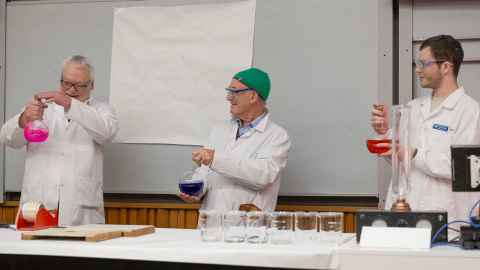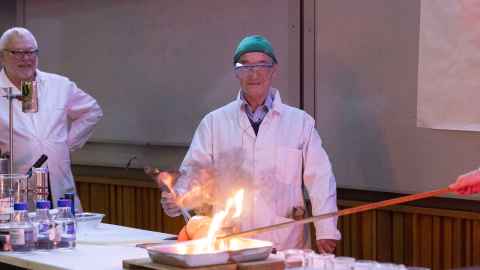Gunpowder and gases: how David Williams kicked off a life in science
1 November 2023
Professor David Williams is partial to blowing things up. In retirement, he’s happy to cool things a bit.

In the pharmacies of 1960s Auckland, an 11-year-old David Williams could buy all the ingredients for gunpowder ... and that was just the start.
Concentrated hydrochloric acid sat on the cleaning products shelf of the local store.
“It came in an octagonal bottle with a cork in it,” the chemistry professor from the Faculty of Science at the University of Auckland enthuses.
“Eleven years old. Oh my God.” Joy.
An ‘adventurous’ family friend up the road in Mt Roskill – “he was mostly interested in explosions” – blasted a path for David’s entrée into the scientific life by sharing his extensive chemistry set.
Contagious enthusiasm, self-deprecation, a sense of fun, the tone of Professor David Williams’ valedictory lecture delivered in September, 63 years later, and titled “Occupation: scientist”, showcased qualities that have helped him galvanise researchers to get things done.
“You’ve just had the David experience,” colleague Professor Cather Simpson told the audience.
Unusual for switching between academia, private enterprise and government, David has helped develop chemical sensors for detecting gas, pregnancy and air pollution. Corrosion is another big interest.
Holding about 50 patents, he has co-founded a string of technology companies in the UK and New Zealand and is credited with changing the culture at the MacDiarmid Institute for Advanced Materials and Nanotechnology by helping scientists commercialise their research.
Contagious enthusiasm, self-deprecation, a sense of fun, the tone of Professor David Williams’ valedictory lecture delivered in September ... showcased qualities that have helped him galvanise researchers to get things done.
He says scientific advances come via curious people connecting – the chance conversation at the water cooler, and overcoming shyness to approach a stranger at a research conference – not bureaucrats’ spreadsheets. He despairs at universities feeling they must chase rankings, and the pressure on researchers to publish constantly.
Sitting on the deck of his Kerikeri home, drinking wine with Mary, his wife of 51 years, David looks across Doves Bay to Hullabaloo, his 11m sailing yacht. Taking up sailing late, after returning to New Zealand 17 years ago, he rates completing the famous Auckland to Russell Coastal Classic as a lifetime achievement.
Born into a Welsh family who arrived in New Zealand in 1957, David thrived at Lynfield College, getting the run of the science lab in exchange for setting up the next day’s demonstrations.
“Oh my God.” Heaven.
When his father was fishing at Whatipū in West Auckland, David wedged himself between the rocks, sheltering from the cold, to work on maths problems. A ‘ripple tank’ for studying waves in water occupied most of his bedroom for months, on loan from the physics teacher.
“Yes, I was a nerd,” he says.
Graduating with a PhD in electrochemistry from the University of Auckland in 1974, the next stop was Oxford and what David recalls as an encounter with confidence-crushing condescension towards a colonial ‘hick’.
Persevering, he switched to Imperial College London, a place teeming with enthusiasts from everywhere, and explored metallurgy, building a furnace for experiments in extracting zinc from slag, and securing his first patent.
With Mary pregnant, the couple swapped London for industrial Birmingham and a steady job for David, experimenting with titanium for alloys.
Armed guards and fences ringed his next workplace: the UK government’s Atomic Energy Research Establishment, an Aladdin’s Cave of amazing facilities, brilliant scientists, and stimulating challenges.
“Man, your brain just exploded.”
Located at Harwell, south of Oxford, the facility had thousands of staff who converged in the morning and diverged in the evening, four nuclear reactors and two particle accelerators.
“It had people who could do anything.”

David says scientific advances come via curious people connecting – the chance conversation at the water cooler, and overcoming shyness to approach a stranger at a research conference – not bureaucrats’ spreadsheets.
Famously, David led the atomic agency’s investigation of the bombshell claim in 1989 that two American chemists, Martin Fleischmann and Stanley Pons, had achieved ‘cold fusion’; nuclear fusion at room temperature in a test tube instead of at 15 million degrees Celsius in the sun.
Fleischmann had been a mentor and close colleague. David’s team spent months investigating, but discovered nothing to support the claim.
“We have no heat, we have no gamma rays, we have no neutrons, we have got nothing, basically,” he told an interviewer. “Sorry.”
Condemning neither Fleischmann nor Pons, he told reporters that, regardless, it was important to leave room for “mad ideas”. The headline that resulted from that remark was “Cold fusion dismissed as ‘mad idea’”.
Switching back to academia, David’s career peak was heading the chemistry department at University College London from 1999 to 2002. He then became chief scientist at UK company Inverness Medical Innovations, working on rapid biochemical tests, such as pregnancy tests, with his former postdoctoral student as his boss.
He returned to New Zealand and the Faculty of Science at the University in 2006, where he’s renowned for the passionate way he conveys the excitement of science.
This year, six decades on from his schoolboy experiments, David helmed a magic show for intermediate school pupils for the faculty’s ‘Incredible Science’ event.
Immersing a blow torch in a dish of soap, he made bubbles full of explosive gas. A glowing candle provided ignition.
The kids, in awe, no doubt thinking, “Oh my God”.
Story by Paul Panckhurst
This story first appeared in the November 2023 UniNews.
The writer is also the media adviser for the Faculty of Science.
Media contact
Paul Panckhurst | Faculty of Science media adviser
M: 022 032 8475
E: paul.panckhurst@auckland.ac.nz